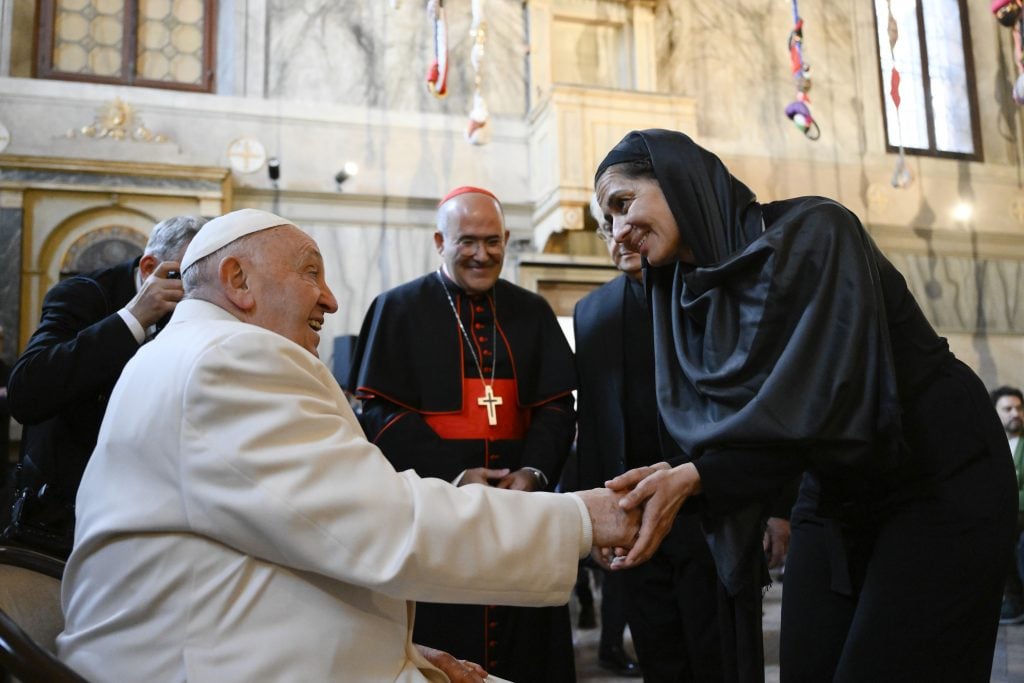Art World
Pope Makes First-Ever Visit to the Venice Biennale
"The world needs artists," the Pope declared, drawing attention to the contributions of women like Frida Kahlo and Louise Bourgeois.

"The world needs artists," the Pope declared, drawing attention to the contributions of women like Frida Kahlo and Louise Bourgeois.

Jo Lawson-Tancred

Pope Francis became the first pontiff to visit the Venice Biennale after a planned visit to the Vatican’s Holy See pavilion at the 60th Venice Biennale on Sunday, April 28. The 87-year-old leader of the Catholic Church arrived by helicopter for a tour of the exhibition “With My Eyes,” which features works by artists like Maurizio Cattelan, Simone Fattal, and Corita Kent, and is installed throughout a women’s prison on Venice’s Giudecca Island.
The pope stressed the power of art to address societal ills, adding “the world needs artists.” Responding to the location, he spoke specifically of the important contributions of women artists like Frida Kahlo and Louise Bourgeois. “I hope with all my heart that contemporary art can open our eyes, helping us to value adequately the contribution of women, as co-protagonists of the human adventure,” he said.

Pope Francis views the Vatican Pavilion installation at the Venice Art Biennale in the Giudecca’s women’s prison facility on April 28, 2024 in Venice, Italy. Photo: Vatican Media via Vatican Pool/Getty Images.
The pope also met with the penitentiary’s roughly 80 female prisoners, offering them some words of motivation. “Prison is a harsh reality, and problems such as overcrowding, the lack of facilities and resources, and episodes of violence, give rise to a great deal of suffering there,” he said. “But it can also become a place of moral and material rebirth.”
To that end, he encouraged the inmates to take the opportunity to rebuild their lives “brick upon brick, together, with determination” and noted that everyone, including himself, has made mistakes for which they must seek forgiveness. He praised their participation in the art exhibition as an example of how “paradoxically, a stay in prison can mark the beginning of something new, through the rediscovery of the unsuspected beauty in us and in others.”

Pope Francis’s first stop on his Sunday pastoral visit to Venice takes him to the Giudecca Women’s Prison, where he told inmates that he very much wanted to meet them right at the start of his visit to tell them they hold a special place in his heart. Photo: Vatican Media via Vatican Pool/Getty Images.
It was widely remarked on by the press that he appeared engaged and energetic despite recent bouts of ill health, including the bronchitis that forced him to cancel a trip to Dubai in December.
Later, Pope Francis attended some other appointments across the city. He gave an open-air mass before a congregation of some 10,000 in Venice’s iconic St Mark’s square, during which he spoke admiringly of the city’s beauty but also expressed concern over its future due to the effects of climate change and overtourism. While meeting with a group of some 1,500 young people at the basilica of Santa María della Salute, he warned them against getting too caught up with digital distractions, urging “leave the cell phone and encounter people!”

Pope Francis leaves St.Mark’s basilica at the end of his visit on April 28, 2024 in Venice. Photo: Alberto PIZZOLI / AFP via Getty Images.
The Vatican’s exhibition is curated by the Italian art historian, Chiara Parisi, director of the Centre Pompidou-Metz, and Bruno Racine, CEO of Venice’s Palazzo Grassi–Punta della Dogana. Fitting with the Biennale’s broader theme of “Foreigners Everywhere,” the exhibition looks at life on the margins of society.
Some of the standout works include a vast black-and-white mural by Maurizio Cattelan depicting the soles of his own dirty feet, an obvious allusion to Jesus’s humble foot washing, and a neon sign reading “siamo con voi nella notte,” or “we are with you through the night,” by the Palermo-based collective Claire Fontaine. Meanwhile, the inmates have also made their own contributions, such as poetry on the prison walls.

Pope Francis arrives at the Giudecca’s women’s prison facility on April 28, 2024 in Venice, Italy, where Maurizio Cattelan’s mural is on display. Photo: Vatican Media via Vatican Pool/Getty Images.
As these works are on view at a working prison, would-be visitors must book appointments in advance and undergo a security clearance on arrival.
The decision to stage these works in a prison has captured the art world’s attention and been subject to some debate about the ethics of such an exhibition. Perhaps the most controversial exhibit is a short film about daily life in the prison by Italian artist Marco Perego, which stars his wife, actress Zoe Saldaña, performing as an incarcerated person alongside several real convicts.

Pope Francis meets with artists of the Venice Art Biennale in the Church of La Maddalena in the Giudecca’s women’s prison facility on April 28, 2024 in Venice, Italy. Addressing the group the Pope praised artists as true visionaries who can see beyond the boundaries of our world. Photo: Vatican Media via Vatican Pool/Getty Images.
As Artnet News’s Naomi Rea noted after visiting the show during the Biennale’s vernissage week, the imprisoned women are shown in moments of startling vulnerability taking showers or being roughly manhandled and strip searched. Meanwhile, Saldaña’s character is afforded more dignity.
The Holy See pavilion was initiated by Pope Benedict XVI in 2013 to encourage a stronger relationship between the arts and the Church.
“With My Eyes. Holy See Pavilion” is on view through November 24 at the Guidecca Women’s Detention Home in Venice.